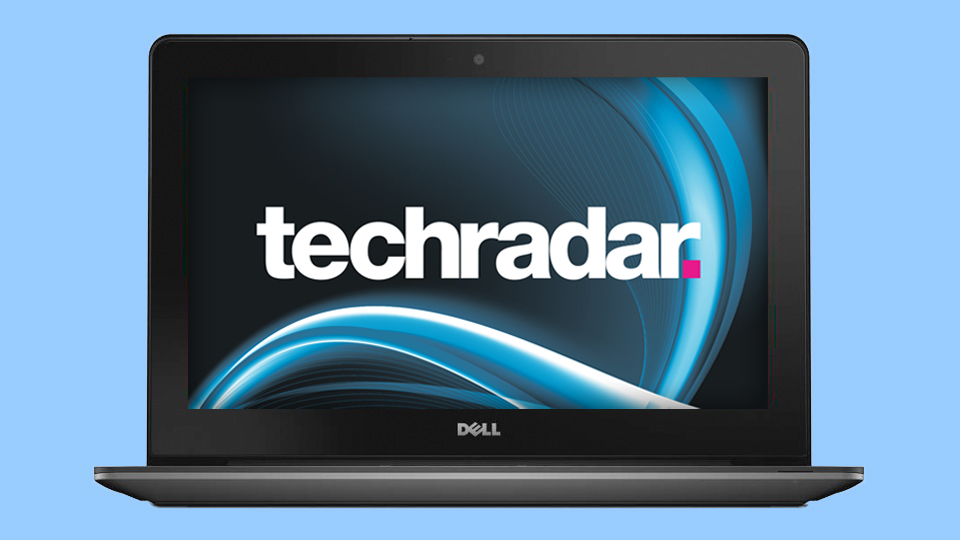Why you can trust TechRadar
Physically, the Dell Chromebook 11 is smack in the middle of other 11.6-inch Chrome laptops, measuring in at 11.6 x 7.9 x 0.97 inches (W x D x H) and weighing 2.9 pounds. It's barely lighter than the 2.97-pound Acer C720P Chromebook, which is also thinner at 11.34 x 8.03 x 0.78 inches. For an even smaller and lightweight machine, you should consider the 11.69 x 7.68 x 0.69-inch HP Chromebook 11 that hits the scale at 2.3 pounds.
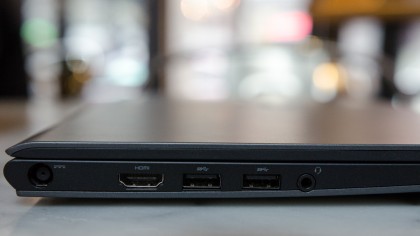
Of course, if more screen real estate is your priority, the first Toshiba Chromebook is a tiny bit bulkier with a 13.3-inch screen. Despite the extra glass, the Toshiba model is only marginally larger at 12.9 x 8.9 x 0.8 inches and 3.3 pounds.
Spec sheet
Here's the Dell Chromebook 11 configuration sent to TechRadar:
- CPU: 1.40 GHz Intel Celeron 2955U (dual-core, 2MB Cache)
- Graphics: Intel HD Graphics
- RAM: 2GB DDR3L
- Screen: 11.6-inch, 1366 x 768 resolution LCD
- Storage: 16GB SSD (plus 100GB of Google Drive for two years)
- Ports: 2 USB 3.0, HDMI, SD card reader, headphone/mic jack, Kensington lock slot
- Connectivity: 802.11 a/b/g/n Wi-Fi, Bluetooth 4.0
- Camera: 720p HD webcam
- Weight: 2.9 pounds (1,300g)
- Size: 11.6 x 7.9 x 0.97 inches (294.64 x 200.7 x 24.6 mm) (W x D x H)
Externals aside, hardware specifications are where all Chromebooks start looking identical, and that's no different for this Dell unit. One of the niceties that's appearing on more and more Chrome OS machines is a 16GB SSD. As most Chromebooks live purely on cloud storage with 100GBs of free Google Drive storage for two year, there's no need for a heavy and sluggish hard disk drive. For those who want an extra bit of local storage for their music library, the $299 (about £179, AU$322) Acer C720P comes with a touchscreen and a 32GB solid-state drive, double the capacity seen on most models.
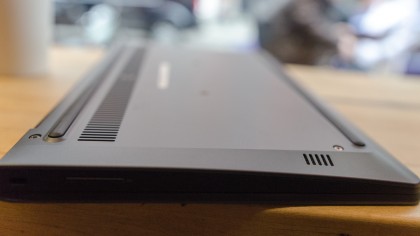
The Dell also closely resembles the $279 (around £167, AU$309) Toshiba Chromebook and the C720P. Part for part, all the laptops feature the same 1366 x 768 resolution screen and even the same CPU. The only thing that Toshiba has over Dell is a larger 13.3-inch screen.
For this review, TechRadar was given a 2GB version of the Dell Chromebook 11 that costs $279 (about £167, AU$309). The American-branded notebook can be configured with 4GB of RAM – slightly bumping up the price to $299 (about £179, AU$323).
Nigh-immortal battery life
Despite my best efforts to completely run down the battery as quickly as I could, the Dell Chromebook 11 put up an amazing fight for an outstanding 8 hours and 22 minutes. I stress-tested the battery, putting the machine under as much load I could between watching the entirety of Olympus Has Fallen and playing through a few levels of Bastion.
Sign up to the TechRadar Pro newsletter to get all the top news, opinion, features and guidance your business needs to succeed!
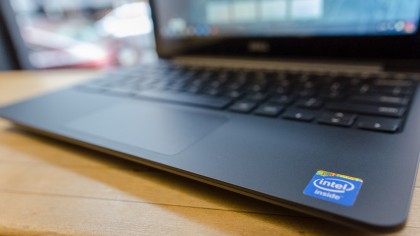
Even under the most intensive loads, the battery meter never dipped below a projected five hours. With regular use – setting the screen at 65% brightness, listening to Spotify, and working on Google Drive – I could easily see the battery life stretching to 10 and even 12 hours by lowering the screen brightness and staying away from YouTube. This is a laptop you can leave the house with and forget the charger.
A Trojan app store
I was impressed with how this Chromebook danced with Bastion without missing a step. Even in a room full of 25 tiny enemies and myself a hammer-wielding tornado, the frame rate never hitched. Unfortunately, though, Bastion is one of very few games that have been officially ported to the Chrome App Store.
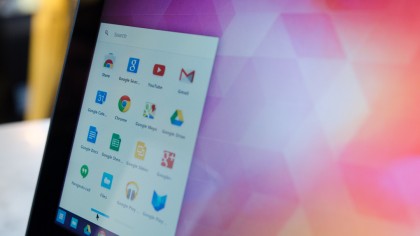
The online shop is full of familiar titles like Spelunky and CounterStrike, but these are unofficial ports. Worse yet, some games are thinly masqueraded online advertisements. Other than a few notable titles like From Dust, gaming on this machine – and invariably all Chromebooks – is limited to online Flash games and social games on Facebook.
The same problem stems to photography oriented applications. Online image editors like Photoshop Express and Pixlr have gotten more complex, incorporating layers and allowing you to stack filters, but the actual editing tools are still simple. Users can change the brightness, contrast, and white balance, but these are basic adjustments for images. Anyone used to powerful, yet simple solutions like Lightroom or Apple's Aperture won't find an equivalent app on Chrome OS.
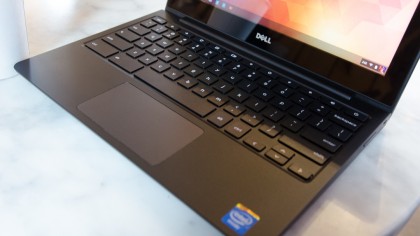
And there's still no way to work with RAW image files in the browser. A few web-based services, like Pics.io, can convert RAW files into JPEGs; after which you can edit the files. That's hardly a sensible solution when working with hundreds of images. Google recently added the ability to work RAW files on the Chromebook itself. However, the built-in image editor failed to recognize any of my images taken with either my Nikon D7000 or Canon 70D.
Brilliant sound, terrible screen
The lack of image editing capabilities on Chrome OS was a bit disappointing, but for the Dell Chromebook 11, this might actually be a good thing. The screen on this cloud-powered laptop displays just about any picture with a bluish tinge, ruining any color accuracy. Low contrast also exacerbates the screen's poor quality, which caused blacks to appear as gray tones no matter how low I set the backlight.
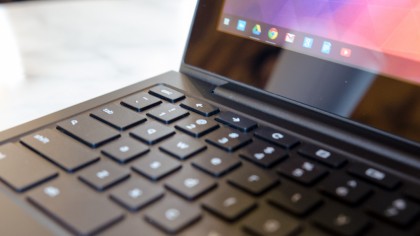
The screen might have it's issues, but I was thoroughly surprised by the quality of this laptop's speakers. Whereas most notebook speakers in this size and price range end up sounding like tin cans, there was barely any of the same hollow tones with the Dell. Rather, the speakers were able to carry high and low tones just like a good pair of Sennheiser headphones, though with slightly less bass than a pair of cans by Beats.
Passing the input standard
There isn't any drama to be seen with the keyboard on this machine, as with most Dell products. All the keys are exactly where you'd expect, without an oddly displaced Tilde or a short Shift key. Chrome OS newcomers might be confused by the lack of a dedicated Caps Lock key, which has been replaced by a search button. But users that want to get back to yelling on the internet can simply turn on the toggle by hitting the Alt and search keys together.
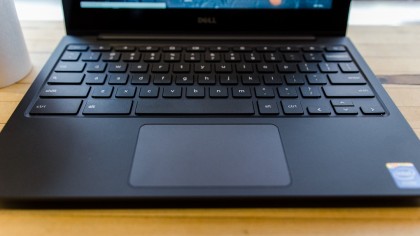
The trackpad on the Dell Chromebook is also great and perfectly sized for sliding the cursor around the 11.6-inch screen. Presses also resound with an audible click, and there is no mushiness that some other budget laptops suffer.
Kevin Lee was a former computing reporter at TechRadar. Kevin is now the SEO Updates Editor at IGN based in New York. He handles all of the best of tech buying guides while also dipping his hand in the entertainment and games evergreen content. Kevin has over eight years of experience in the tech and games publications with previous bylines at Polygon, PC World, and more. Outside of work, Kevin is major movie buff of cult and bad films. He also regularly plays flight & space sim and racing games. IRL he's a fan of archery, axe throwing, and board games.
